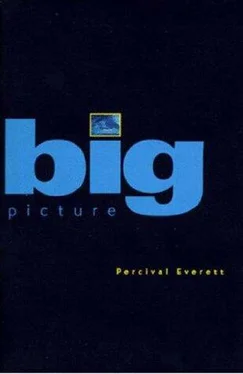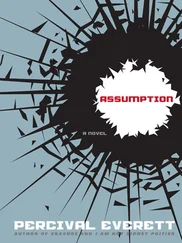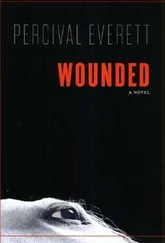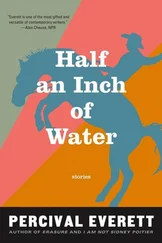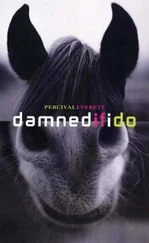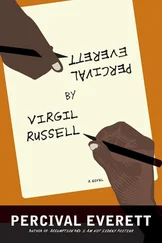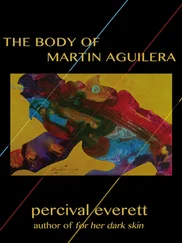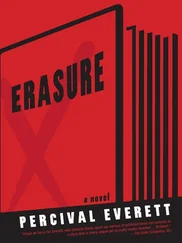“A lot of people don’t like the Dicotyles tajacu ,” the woman said as she poured. “That missing eye.”
“I see.”
She pulled a menu from the large front pocket of her apron and set it on the place mat in front of him.
“You know all of these animals?”
“They’re here every day, all day long. I’m here every day, all day long. You hunt?”
Michael shook his head.
“I’ll come back for your order.”
Michael studied the pig. At that moment, Gail was probably in bed with Bob having her skin examined. He recalled when he and Gail had first met: she had claimed to understand his pain, claimed she wanted to be near it, and wanted to watch him at work. They were standing in front of a canvas of Michael’s at an exhibition of his in Santa Fe.
“There’s so much pain in it,” Gail said from behind him as he faced the painting.
Michael turned and looked at her. “Where?” he asked.
“Everywhere,” she said.
“I don’t see it,” he said.
Gail was confused, but pressed on. “Here,” pointing to a sweep of maples edged with Indian Yellow across a field of pthalo blue. “Here, this looks like acute pain to me, like intense loss.”
Michael looked where she pointed, got up close, and touched the paint with his fingers. “You don’t really believe that shit, do you?” But when he looked back at her face he saw she was near tears. “I’m sorry,” he said. “You’re right about the pain.” A lie only because he believed that indeed he was lying every time he attempted to articulate how painting made him feel. In the middle of putting the paint on the canvas, when the desire to slide a razor across the arteries of his forearm was large and explicit before him, he recognized the urge as indulgent and decided it was made up, thought no one really had such feelings and so would sit down, leaving the work alone and rub his temples until he forgot his bad mood. But as Michael said to Gail that she was correct about the emotion she saw in his picture, he felt pleased to be able to share the pain. He was genuinely interested in this woman and what she was saying, but he also experienced considerable guilt because he knew that he was viewing this conversation as a hasty way to get her into bed.
“I’m Gail Lybrand.”
“Michael Lawson.”
“I know.”
They had sex that night and continued to have sex for eight years and in that time Michael had sex only with Gail, although he was tempted once to be unfaithful with an anthropologist whom he’d met in the hills south of Santa Fe, but didn’t because the thought of sex with another woman made his head hurt more and more and he took the pain as a sign. And so he went home to his wife of seven months and found that his headache didn’t go away, but in fact got worse, and then Gail became angry with him because he was too sick to make love.
“What’s this?” Michael said, looking at the chocolate-covered doughnut the waitress put on the table. The doughnut had been microwaved and the brown veneer had become thin on top and formed a series of puddles around the circle.
“On the house. Because you don’t hunt.” The waitress pulled her pad from her apron pocket and took the pen from behind her ear. “What’ll it be?”
“How much for the pig?” Michael asked, surprising himself.
“Excuse me?”
“The head.” Michael pointed up. “I think I’d like to buy it.”
“The Dicotyles tajacu ?”
“Yes.”
“You want to buy the Dicotyles tajacu ?”
“I believe that’s what I’m saying.”
The waitress tapped her pad with her pen and looked at the boar’s head as if for the first time, then turned and walked away across the room and into the kitchen. The single door swung after her with a barely audible squeak. The bearded face of a large man suddenly appeared from the kitchen and disappeared just as quickly. Then all of him appeared, dressed in white or what was once white. Michael liked the stains on the man’s clothes, ochre and Permanent Rose and a deep green like an avocado’s skin.
“Waitress tells me you want to buy the Dicotyles tajacu ,” the cook said.
Michael nodded, but felt a little afraid sensing the man’s displeasure.
“Why?”
“Because I like it,” Michael said.
The cook sat across from him in the booth and looked absently across the room and out the window at the highway. “I’ve never had anybody wanting to buy one of the animals before. What would you do with it?”
“I’m an artist. I just like it. I wouldn’t do anything to it,” was what he said, but he wanted to say that he was unsatisfied, agitated, desolate in heart and entrails, sick with pain, and sickened by curiosity, of all things, and that the Dicotyles tajacu had become an object of that sickness. “I’m not going to hurt it.”
“He’s got an eye missing,” the cook said. “The left one.”
“I realize that,” Michael said. “I think that’s why I like it so much.”
The cook scratched his thick neck and pulled up at the back of his shirt collar. “The Dicotyles tajacu has been here since 1967.”
“Taken by C.C. Wilcox,” Michael said.
“You know, business has been pretty rough, what with the freeway and all those fast-food places in Fort Collins. A breakfast burrito. An egg McNuthin’. It’s hard for the little guy to make it now.”
Michael nodded. “Are you C.C. Wilcox?”
The cook shook his head. “Kirk Johnston.”
“My name is Michael Lawson.”
The cook stared off into space.
“I can see you’re attached to the pig …”
“Dicotyles tajacu ,” the cook corrected.
“Dicotyles tajacu ,” Michael said. “How does one-fifty sound?”
The cook looked up at the head on the wall and his eyes seemed to well with tears, the meaty fingers of his right hand were wringing the meaty fingers of his left. “Business has been awful slow.” But the cook was speaking more to the taxidermied head than to Michael.
“One seventy-five,” Michael said.
The man was openly weeping now. His big head fell forward to his hands; his big sides were heaving under his short-sleeved white shirt. The waitress had come out of the kitchen and was walking across the room, tossing them a sidelong glance but not approaching. A man with blond hair and his blond wife, who were seated across the room in a booth beneath a moose, stared and whispered.
Through his tears, Kirk the cook managed to say, “Would you consider the Ovis canadensis ?”
“No, I want this one,” Michael said. The idea of owning it was getting all twisted inside him. He didn’t want to hurt the cook, but the head, the head, the idea of the head was calling to him. “Two hundred.”
The cook let out a loud wail. His sobs caught in his throat, choking him; tears were glistening in his beard.
The blond couple from across the room climbed out of their booth and scurried out. The bell hanging from the door was slapping against the glass.
“Two hundred dollars.”
“Waitress,” the cook called. When she came he said, still crying, “Wrap up the Dicotyles tajacu .”
The waitress began to sob as well, her mascara streaking quickly as she turned her face from the stuffed head. Her crying voice was higher pitched than her talking voice and Michael paused to observe this.
The cook stood. “Wrap it nicely, waitress.”
Michael counted out two hundred dollars onto the lacquered wooden tabletop. The cook picked up the bills along with a paper napkin and, without counting, stuffed the money into his breast pocket, then walked on unsteady legs back across the room and through the swinging door of the kitchen.
Читать дальше
